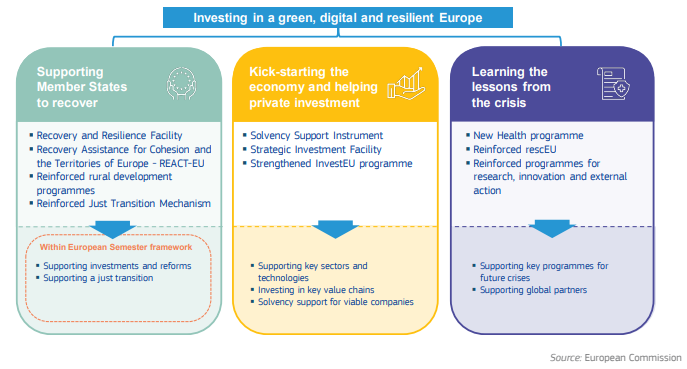In the light of the Coronavirus-pandemic and the unfolding economic crisis, the European Commission published its Next Generation EU Recovery Strategy and its adjusted work programme to ensure an economic recovery that supports transition efforts of the Commission.
Therefore, the recovery plan does not only function as a stimulus package, but actively seeks to transform existing economic models to support the EU’s Green Deal and digitalization strategies. The Recovery plan consist of two main strands: The ‘Next Generation Europe’ package, which is a € 750 billion grants-and-loans recovery plan, alongside with a revamped Multiannual Financial Framework that accounts for the arising long-term financial needs due to the Corona-virus pandemic. Next Generation EU will be rolled out under three pillars: The Solvency Support Instrument will provide up to €300 billion in guarantees to European enterprises that are in jeopardy due to the COVID-19 crisis. Whereas the programme will be rolled out via the European Investment Bank and their national partners, this support needs to reflect the needs of cooperatives in industry and services as well, as all social economy enterprises that are frontline service providers during the crisis.
Furthermore, several instruments are being levied to support workers and businesses, adding another total of € 540 billion under the Support to mitigate Unemployment Risks in and Emergency (SURE), ESM Pandemic Crisis Support and the EIB Guarantee Fund for Workers and Businesses. The Commission has explicitly mentioned social economy as a main target of this programme, as it expects that the economic implications of the Covid-19 crisis will be particularly severe in the sector. At the same time, the Commission acknowledges and reinforces the potential of social economy to support people particularly affected by the crisis.
The proposal foresees to finance the Next Generation EU Programme via Commission-issued bonds with a maturity from 3-30 years. The Commission plans to support member states to generate tax revenues stepping up the fight against tax evasion. Furthermore, discussions on the EU’s Own Resources Decision taxation and revenues from increased carbon emission license trading are sparked to refinance this recovery plan. Therefore, the decisions published on 27 May 2020 are broadly seen as a mayor development in the European Integration process with implications beyond the mere economic recovery and will influence policy decisions for the years to come. It is therefore advised to follow these proposals closely and develop an advocacy strategy early on.
The next steps
Next Generation EU provides several levers to react to the COVID-19 crisis and to invest in the just and digital transitions. CECOP welcomes the efforts taken by the European Union to react jointly to the unfolding crisis and using this moment to support transitional efforts. CECOP will follow the design and implementation of these programmes closely and urges the European Institutions to reflect the needs of cooperatives in industry and services and the social economy in both their crisis response and their long-term strategies.








 Employment & Social Inclusion
Employment & Social Inclusion 

